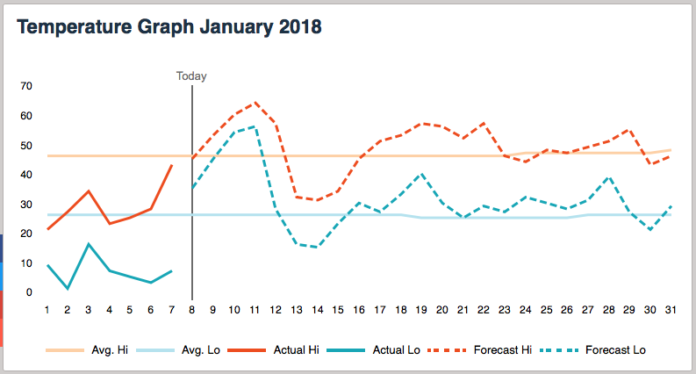By Amye Anderson
UCBJ Managing Editor
UPPER CUMBERLAND – Shane Buck, owner of Buck’s Plumbing and Sewer Service, and his crew have been busy navigating an increase of calls pouring into his office since temperatures plummeted last week.
As the temperatures plunged into the teens and single-digits, calls from panicked homeowners about frozen and busted pipes began pouring in and the Buck’s crew has been logging 10- and 12-hour days to keep up with the demand.
Compared to a typical week, he says he’s seen an increase of 50 to 65 percent in service calls during the recent arctic blast.
“As far as an increase in calls, that’s an understatement,” Buck told the UCBJ during a break. “And, of course we can’t get to them all. Nobody can.”
The calls have been nonstop. While the company doesn’t offer 24/7 service, they’ve been responding to as many jobs as they can.
As temperatures plunged into the teens and even single-digits – compared to average December/January temperatures ranging between 20 and 40 degrees – some homeowners may have been caught off guard.
“A lot of people are prepared for it but you’ve still got a lot that are not,” he said. “Even though they do some precautions, they still get froze up in various places.
“We’ve been to brand new houses as well as old – it’s just the way people have their plumbing designed, or they don’t have it insulated right, or where the cold air is hitting it straight on,” he added.
Even Buck, a seasoned plumber, says his water heater wasn’t immune to the recent cold snap.
“Even at my house, I’ve got a water heater in my basement, and it even froze up,” he said. “It’s never froze up on me. It’s that cold.”
January and February are typically the coldest months for the region – a time Buck says he and his crew stay busy.
“We’re just now getting in (winter),” he added. “Usually it doesn’t get this cold until about the middle of January.”
With nearly two more months of cold temperatures ahead, Buck says it’s important to keep an eye on the forecast to properly prepare for a freeze event.
“Of course, we’re in Tennessee so it’s unpredictable most of the time,” he said with a laugh.
With a crew of four technicians, Buck’s Plumbing has been busy fielding calls, trying to thaw and repair as many affected pipes as possible.
Temperatures have already begun to warm into the 40s but Buck warns that once frozen pipes begin to thaw, more calls reporting busted pipes are likely.
The standard, tried-and-true preventative measures still apply – ensure water pipes are insulated, crawl space vents are closed, and water, both hot and cold, is left to drip, Buck says.
“A lot of people just think of the cold (water),” he said. “But, hot (water) stays in the water lines for a period of time. They’re going to cool off and, therefore, freeze as well.
“What a lot of people aren’t doing is letting their waters run – not just during the night but during the day too because it hasn’t gotten above freezing,” he added.
The potential cost of running water may irk some residents mindful of their utility usage and expenses; especially during winter months when heating systems are running ‘round the clock.
In looking at water rates across the region, residential water usage rates listed by the city of Cookeville’s website are $3.07 per 1,000 gallons used inside the city limits and $4.57 per 1,000 gallons outside the city limits. According to the website for the city of Crossville, it costs $5.34 per 1,000 gallons used inside the city limits or $8.02 per 1,000 gallons outside the limit. In Jackson County, residents pay $11 per 1,000 gallons after the first 1,500 gallons of water used; for a minimum rate of $20.25, according to the Jackson County Utility District website.
The temporary cost increase of allowing water to trickle during a freeze event is pennies, Buck says, compared to the cost of emergency calls and repairs necessary to repair busted pipes and water damage to flooring and other surfaces.
“(During) a week, if you let (water) run, you might waste maybe 100 gallons, maybe 200,” he said.
What can homeowners do if pipes are already frozen? Buck recommends having them thawed by a professional rather than allowing them to thaw on their own as the weather improves.
“That’s not really a good idea,” he said. “When water freezes, it expands. If it expands in your plumbing and your pipes, it’s going to bust them.”
Preparedness, he says, is key to preventing damage and racking up costly repair bills.
Attempts to contact other plumbers for input to this story were unsuccessful.









